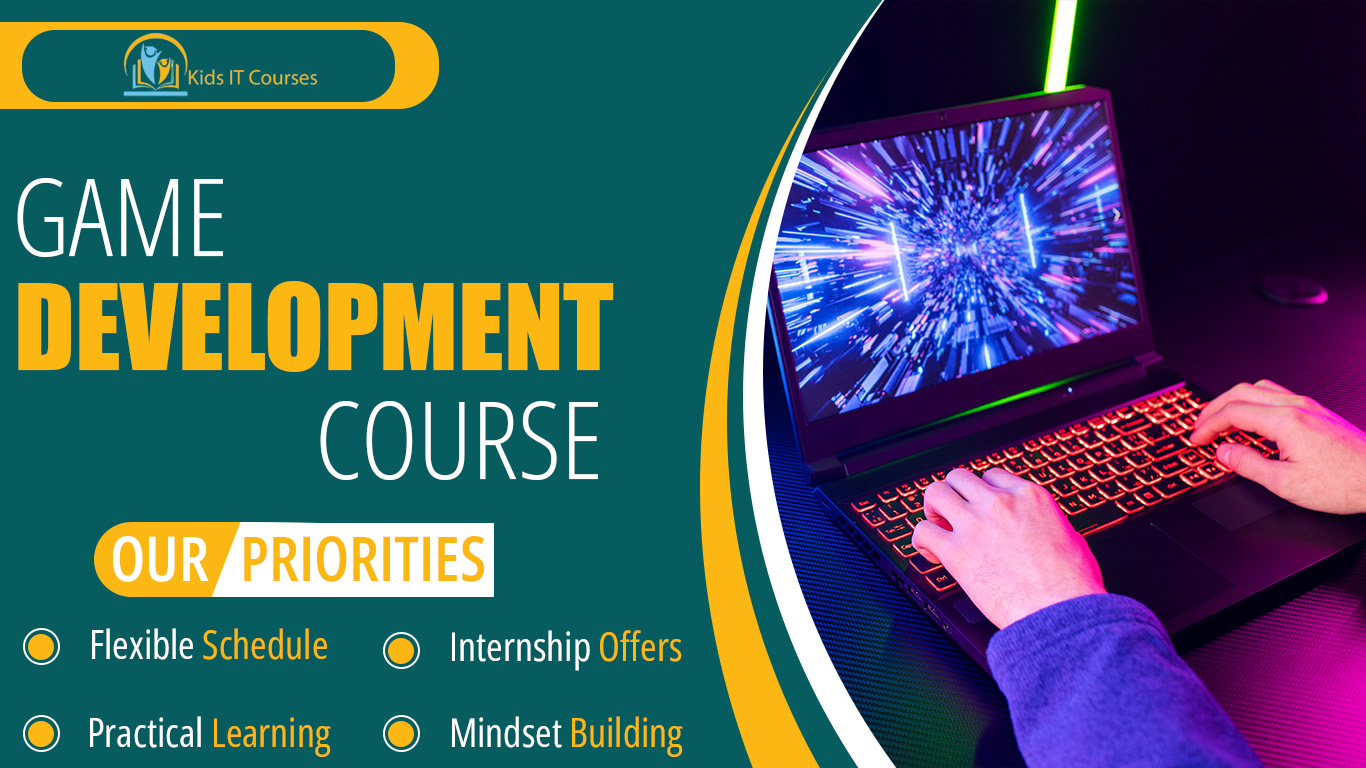
Game Development Course for Kids
- This thrilling course unlocks the magical world of Game Development, allowing kids to turn their imagination into real playable games!
- From designing characters to building game levels, students will explore how coding, art, and creativity come together.
- Whether they dream of making their own mobile game or inventing the next big thing, this course is their first step into the world of digital creation.
Game Development | Kids Short Courses nearby Rawalpindi
Definition
• Kids learn how games are built from start to finish. They create fun games they can actually play!
• They use kid-friendly platforms to design and code games. It makes learning feel like playtime with a purpose.
• Kids learn how to make characters move, score points, and win or lose. They think like real game makers and fix their own bugs.
• They design their own characters, backgrounds, and stories. It’s a great way to turn ideas into something real.
• They can work with friends, share ideas, and play each other’s games. It builds communication and teamwork skills.
• Game development teaches real coding and design skills. It’s a fun start for kids who dream of working with tech or games.
Importance
• Kids learn how to build their own video games step by step. It’s fun and makes them feel like real game creators!
• They learn how to fix bugs and make games work smoothly. It boosts their thinking and decision-making skills.
• Kids create stories, characters, and game worlds. They use their imagination to bring ideas to life.
• They use coding tools like Scratch, Unity, or Python. It helps them learn programming in a fun way.
• Some projects are done in teams where kids help each other. They learn to listen, share, and work together.
• Game design is a growing career around the world. Learning it early gives kids a great head start!
Advantages for Freelancing Purpose
• Kids learn how to design, build, and play their own games. It’s fun and helps them understand how real games work!
• Game coding teaches them to fix bugs and plan steps. It sharpens their thinking like a puzzle!
• They get to design characters, stories, and worlds. It’s a great way to turn fun ideas into something real.
• Kids use simple code to make games run and respond. They learn skills that real developers use.
• Kids can build games together or share their work online. It teaches communication and teamwork.
• Seeing their own game come to life makes them feel proud. It motivates them to learn more and keep creating.
Session 1 : Introduction to Game Development
What makes a good game?
Types of games: platformers, puzzles, adventure
Tools overview: Scratch / Construct 3 / Unity (based on age group)
Interface tour and first “click-to-move” game
Session 2 : Game Design Basics
Characters, backgrounds, and objects
Adding sprites and animations
Movement controls and user input
Build a simple maze or racing game
Session 3 : Logic & Interactions
Conditions (if/then), variables, and scoring
Lives, health bars, timers
Collision detection and effects
Create a basic point-based challenge game
Session 4 : Sound, Music & Polish
Adding background music and sound effects
Creating game menus and start/restart screens
Intro to UI/UX design for games
Add finishing touches to existing games
Session 5 : Level Design & Creativity
Designing custom levels and challenges
Add power-ups, enemies, and levels
Animate characters for jumping/flying/shooting
Build a mini “boss level” or bonus round
Session 6 : Final Project Week
Plan your own unique game
Design characters, set goals, build levels
Test, debug, and polish your final game
Present your game to classmates or family
✅ Bonus Topics (Optional):
Intro to publishing games
Exploring Unity or Godot (for older/more advanced kids)
Game storytelling and creative writing
Freelancing opportunities in game design
